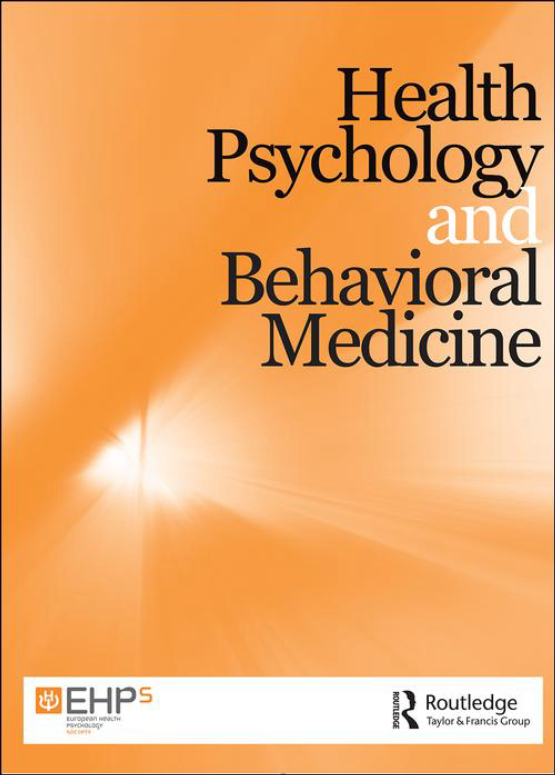Submit a Manuscript to the Journal
Health Psychology and Behavioral Medicine
For an Article Collection on
Promoting Health Behaviour Change Using Episodic Future Thinking: Innovative Strategies for Chronic Disease Prevention and Management
Manuscript deadline
31 October 2024


Article collection guest advisor(s)
Dr. Carina Chan,
La Trobe University
[email protected]
Timothy Skinner,
La Trobe University
[email protected]
Promoting Health Behaviour Change Using Episodic Future Thinking: Innovative Strategies for Chronic Disease Prevention and Management
Chronic diseases pose significant economic and health burden to the individuals and the health care system. Many non-communicable diseases require lifestyle changes for better management. Maintaining a healthy weight, engaging in physical activity and making healthy food choices are promoted to reduce risk of common non-communicable diseases such as diabetes, cardiovascular diseases and obesity. However, behavioral interventions that focus on lifestyle changes are often labor-intensive and unsustainable. It is important to explore, understand and potentially address psychological barriers that can affect healthy lifestyle choices.
One important but under-researched factor that has shown evidence in affecting health decision making is delay discounting. Delay discounting refers to a tendency to favor smaller, immediate rewards over larger long-term future outcomes. For example, in deciding whether to go for a walk after a tiring day of work, those with high delay discounting put greater value on immediate short-term gratification (e.g., watching television on a sofa) over the future long-term goal of improved health (e.g., weight reduction). Evidence has demonstrated that delay discounting is associated with unhealthy behaviors and lifestyle choices and one way to modify this is to find ways to encourage future-oriented thinking. Episodic Future Thinking (EFT) is a technique simulating the visualization and experience of future events. By cognitively simulating future outcomes and making them salient, individuals are more encouraged to make choices that focus on long-term outcomes. Recent evidence has shown the efficacy of EFT in reducing delay discounting but its efficacy in changing health behaviors remains unclear.
This article collection welcomes submission of empirical research article or reviews that expand the current evidence in the following areas:
- The relationship between delay discounting and health behaviors
- Intervention or proof-of-concept studies that adopt EFT to change health behavior in general, pre-clinical and clinical populations
- Assessment of delay discounting
- Innovation in EFT intervention delivery
Please note that data collection for trials commenced after January 2024 needs to be pre-registered.
All manuscripts submitted to this Article Collection will undergo a full peer-review; the Guest Advisor for this collection will not be handling the manuscripts (unless they are an Editorial Board member). Please review the journal scope and author submission instructions prior to submitting a manuscript.
The deadline for submitting manuscripts is 31 October 2024.
A/Prof Carina Chan’s research expertise lies in the understanding of psychosocial issues and mechanisms related to health and health behaviour change. Her research has extended to the regional/rural context, working with multidisciplinary teams focusing on psychosocial factors associated with aging, chronic disease prevention and control, suicide prevention, improving health service delivery and community engagement. Currently, she aims to establish more evidence of episodic future thinking in reducing delay discounting and changing health behaviours among general and clinical populations and how innovation can be built in to facilitate future up-scale of such intervention.
Prof Timothy Skinner is a health psychologist by training, with research expertise psychosocial interventions for diabetes management. He has conducted multi-site clinical trials and translated evidence to inform future practices. His interest in rural health and health care has extended his work to diabetes prevention, the role of sleep in shaping physical, social and emotional wellbeing. He is the Editor-in-Chief of the Australian Journal of Rural Health.
Disclosure Statement
Dr. Carina Chan and Dr. Timothy Skinner have no Conflict of Interest to disclose.
Benefits of publishing open access within Taylor & Francis
Global marketing and publicity, ensuring your research reaches the people you want it to.
Article Collections bring together the latest research on hot topics from influential researchers across the globe.
Rigorous peer review for every open access article.
Rapid online publication allowing you to share your work quickly.
Looking to Publish your Research?
Find out how to publish your research open access with Taylor & Francis Group.
Choose open accessSubmission Instructions
All manuscripts submitted to this Article Collection will undergo desk assessment and peer-review as part of our standard editorial process. Guest Advisors for this collection will not be involved in peer-reviewing manuscripts unless they are an existing member of the Editorial Board. Please review the journal Aims and Scope and author submission instructions prior to submitting a manuscript.